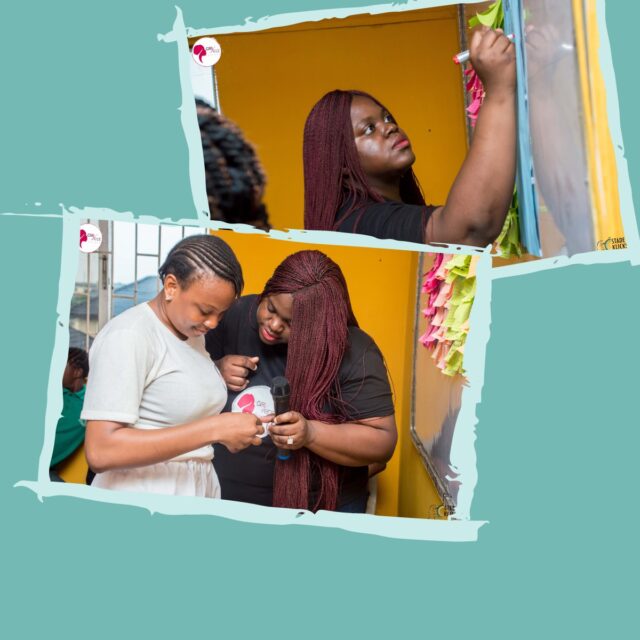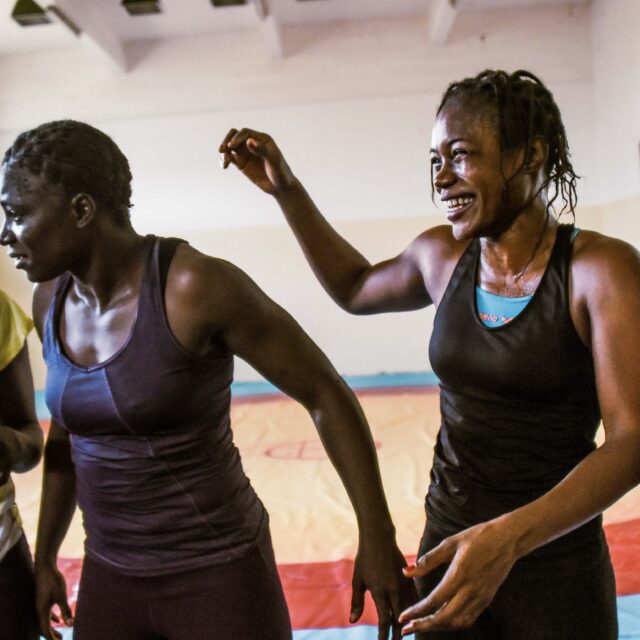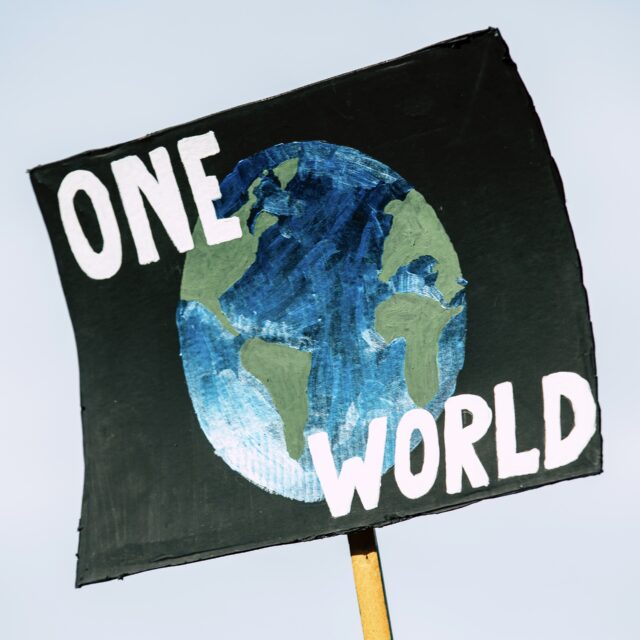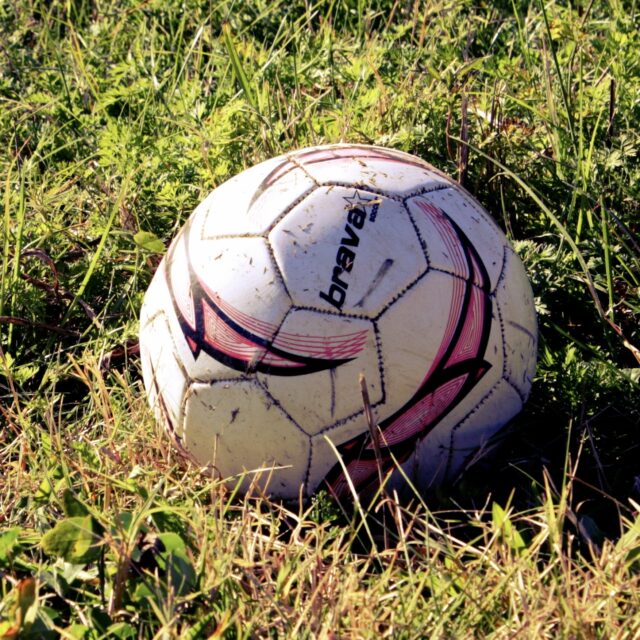Olaoluwa Abagun is an activist and founder of the Girl Pride Circle. Here’s her story about how COVID-19 has impacted girls in Nigeria, and her hope for the future.
For many young girls across Nigeria, their classrooms and schools have served as safe spaces – where they can interact with their peers, learn critical skills, and express their hopes and dreams without fear.
Unfortunately, the COVID-19 pandemic has necessitated the closure of these safe spaces with very limited alternatives for learning and engaging with their peers – especially for those without access to the internet. There has also been a rise in the incidences of sexual abuse of minors, child labour, and other forms of child abuse against girls across communities in Nigeria. The pandemic has emphasised the unpreparedness of law enforcement structures and emergency services to fully protect the rights of women and girls in emergencies and provide critical justice services without delay.
Despite the overwhelming push back against gender equality, I encourage young women and girls to remain resilient and hopeful for the holistic change we are working to create.
And, in most homes, the extra burden of care work in the wake of the pandemic has fallen squarely on the shoulders of women and girls. This has several implications for the health and well-being of women and girls even beyond the pandemic.
But despite the overwhelming push back against gender equality, I encourage young women and girls to remain resilient and hopeful for the holistic change we are working to create.
In my lifetime, I would like to see violence against women and girls become history. I anticipate a day in my lifetime when women and girls can thrive and take up space in all socioeconomic and political spheres of the society without fear of violence.
What my advocacy journey has taught me
My leadership and advocacy journey kick-started at the age of 13, when I was nominated by my secondary school teacher to join the Nigerian Children’s Parliament – a model version of the Nigerian national legislature set up to develop child rights’ advocates. This experience really transformed my perspectives as a curious young girl. I participated in debates on child rights, engaged with high-level policymakers, and interacted with community members.
The experience enabled me gain more insight into several socioeconomic issues affecting girls, such as sexual violence, child marriage, and lack of access to education (including sexuality education and knowledge of sexual and reproductive health/rights).
I anticipate a day in my lifetime when women and girls can thrive and take up space in all socioeconomic and political spheres of the society without fear of violence.
After my experience in the Children’s Parliament, I decided to become a lawyer and advocate for girls’ and women’s rights in order to effectively use my voice to advance the health, rights, and well-being of girls and women – especially in Nigeria. In 2014, as an undergraduate law student, I founded the Girl Pride Circle Initiative as a sustainable platform to pursue these advocacy goals.
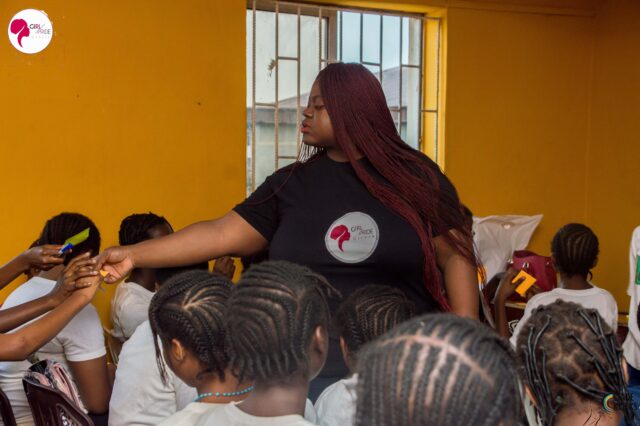
Empowering girls through Girl Pride Circle
The Girl Pride Circle Initiative is a registered NGO in Nigeria that advocates for girls’ rights to education, equal opportunities, and violence-free communities, while equipping adolescent girls with the leadership and advocacy skills to speak up for their rights across their communities. Through in-school education clubs and creative programming methodologies such as martial arts, we educate adolescent girls about leadership, advocacy and social change, sexual and reproductive health and rights, and gender-based violence.
Girl Pride Circle envisions a society where girls’ voices are at the centre of decisions that affect their lives and every girl has ample opportunity to unleash her full potential.
Over the past five years, Girl Pride Circle has reached over 2,500 girls across South West Nigeria. In one of the schools where we have worked since 2016, some of our trained girl advocates activated their knowledge on advocacy tactics to successfully lobby for the first-ever female football team in the school’s history. This made me so proud and assured me that we are right on track in our efforts to amplify girls’ voices.
I have also supported hundreds of adolescent girls to contribute to policy change within their local communities. In 2017, 273 beneficiaries of our education clubs drafted an unprecedented “Community Action Plan for the Prevention of Sexual Violence” for Alimosho community — the largest local government in Lagos. This action plan was endorsed and adopted by the local government and distributed to over 1,500 community leaders to guide local interventions for sexual violence prevention and response.
Last year, up to 50 of the adolescent girls trained by my team also drafted a “Zero Tolerance Policy to Sexual Violence for Religious Communities,” which has now been adopted by 120 religious leaders across Lagos.
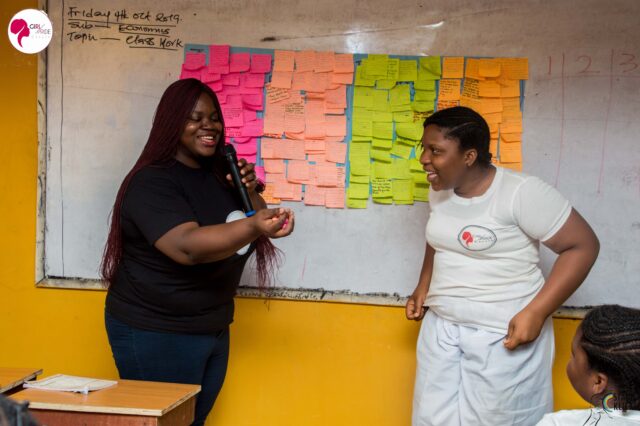
How COVID has impacted our work
Lagos State – where Girl Pride Circle currently works – has remained the epicenter of the COVID-19 pandemic in Nigeria, accounting for over 30% of confirmed cases nationwide. As a result, some of the restrictions and physical distancing guidelines to curb the spread of the virus have brought most of our work to a standstill.
Due to the shutdown of schools since March 2020, it has been impossible to convene our in-school education clubs for adolescent girls. As 99% of the girls we work with do not have access to their own mobile devices, laptops, or internet connection, we have also been unable to move the clubs online.
The pandemic has opened up more opportunities for digital engagement and mobilization — but it has also demonstrated that there is a huge digital divide, which greatly affects girls and young women in Nigeria.
Even as we anticipate that we can resume our in-person workshops in the coming weeks, we have documented these key learnings towards improving our future programming and advocacy interventions.
My advice for activists and decision makers — and my hope for the future
Despite the challenges to women’s and girls’ empowerment, young women and girls must remain resilient and hopeful for the holistic change we are working to create.
I call on governments, policymakers, and other key stakeholders to prioritize the rights and well-being of women and girls in COVID response plans.
I implore all advocates to consciously celebrate every single win on the road to gender equality, no matter how small. In my advocacy journey, I have found that there is a strong tendency to only look forward to the milestones that have not been achieved, while forgetting to acknowledge the little waves of progress that our hard work continues to generate.
I call on governments, policymakers, and other key stakeholders to prioritize the rights and well-being of women and girls in COVID response plans. In particular, leaders need to be intentional about investing in emergency support services, such as rescue services and safe shelters for women and girls experiencing sexual and gender-based violence at this critical time.
